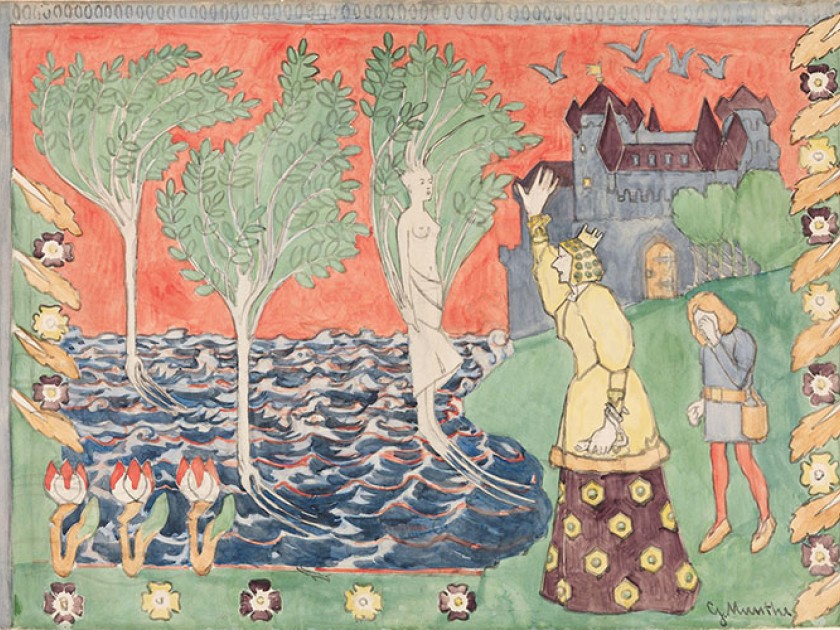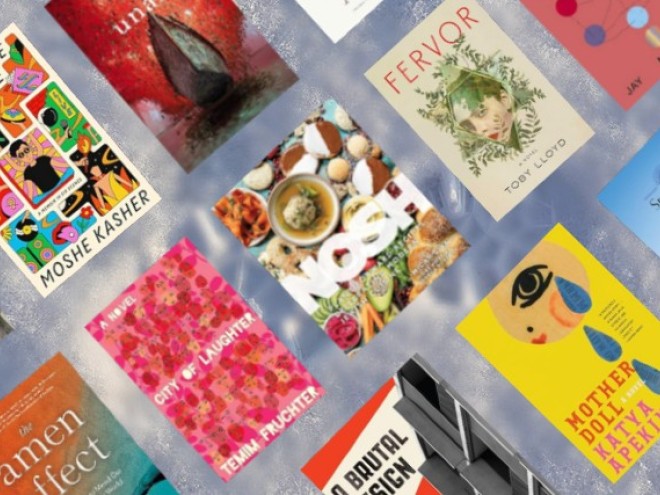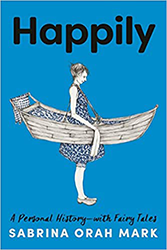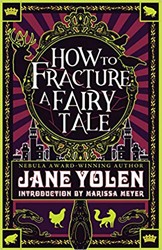
The Stepmother by Gerhard Munthe on Wikimedia Commons, edited by Alex Lezberg
“Once upon a time” is one of the first phrases we come to associate with storytelling. It conjures up a long-ago past, a world unlike our own. But, as authors Idra Novey and Sabrina Orah Mark know, fairy tales can also parallel our present-day lives.
Such is the case in Novey’s Take What You Need and Mark’s Happily. Set in Trump-era Appalachia, Take What You Need is a novel that follows the stories of Jean, an artist residing in an underserved town, and Leah, Jean’s estranged stepdaughter from a former marriage. Happily is a memoir-in-essays that often dips into the surreal. Among other things, it chronicles Mark’s experience in the American South as a mother and stepmother in a multiracial Jewish family.
In this conversation, Novey and Mark discuss religion, race, intergenerational ties, and belonging in America. They also contemplate writing itself — and how fairy tales help them intone the forbidden like a spell.
Kyra Lisse: Both of you are authors of poetry as well as prose. What are your thoughts on moving between genres?
Idra Novey: Each novel I’ve written so far emerged out of a scene or moment I’d previously explored in a poem. The first scene I wrote for Take What You Need came from a poem I wrote several years earlier, about a group of teenagers on the bank of a creek in my hometown. The voices in that poem, the consoling humor of the speakers, helped me figure out the sensibility I was writing toward in the novel.
I return often to the stories of Grace Paley, who also came to fiction from poetry. Paley didn’t adhere to mainstream expectations for plot or character, which is why her unconventional stories have endured. She had brilliant instincts for how to pare a scene down and trust images and interactions to convey larger social tensions, the way a poem would. When I was working on the first drafts of Take What You Need, I’d go back and read Paley’s opening lines. They helped me clarify, over numerous drafts, what I needed to leave implicit in the novel about the challenges of making art in Appalachia.
Sabrina Orah Mark: Many years ago I met a poem, but when she opened her coat, she looked like a story. And when she spoke, she spoke essay, though her first language was poetry. She spoke with a beautiful accent. And she moved like a novel in the evening, but in the morning she moved like a line of ancient verse. Which is to say, she is the poem that I wish all my writing would be.
KL: Near the beginning of your book, you express skepticism about the age-old advice for writers to “tell the truth,” as if there is only one kind. What does “truth” mean to you, beyond the conventional fiction/nonfiction binary? How does that play out in Happily?
SOM: Truths reveal themselves to me when I follow an image past the borders of my story. So, for example, in one chapter, I follow a shard of glass from my sons’ broken iPad to the beak of a crow. Following images as far as they can go, and then even further, and then further still, allows me to access an imaginative landscape where uncomfortable truths, beautiful truths, horrible truths, and impossible truths all grow.
KL: Fairy tales are central to each of your books. In Take What You Need, they act as a kind of salve, helping Leah cope with the news of Jean’s death. Idra, what inspired you to include fairy tales in your book?
IN: My relationship to fairy tales shifted after reading them aloud, in Spanish, to my children. My spouse is Chilean, and every year we visit relatives in Chile over the holidays. They have given my kids many hand-me-down books of fairy tales in Spanish. When I read them to my children, some of the translation choices would strike me as wordy or awkward, and I would rephrase what I read aloud, replacing what one of the dwarfs said, or Gretel’s questions to her brother in the woods. I knew I would eventually write a novel that touched on the intimacy of reconfiguring fairy tales for a child. I needed some distance from those years of mothering small children before I could write about that time with inventiveness, two novels later.
KL: Sabrina, for you fairy tales are like funhouse mirrors, exaggerating reality so that we can see our own lives reflected back at us. I wonder if you could talk more about how fairy tales function in your writing.
SOM: I have a terrible memory, and I wanted a place (other than my brain) to store the beautiful, strange things my sons say to me. Like, “Don’t worry, Mama, I’ll teach you how to button your sweater for when you’re small again.” Happily began as a desire to record, and the desire to keep my sons safe. As if writing down everything they said would create an armor for them to wear. Raising Black Jewish boys in the American South, so far away from where I was raised (emotionally, physically, and culturally), felt like putting together a puzzle with half the pieces missing. Instead of going all the way back to the world I grew up in, back to New York, back in time, back to where I could and couldn’t return — I decided to turn to fairy tales, a place even older than childhood. Through fairy tales, I was able to tell stories I had been too shy, or afraid, to tell before. The fairy tale held my hand and assured me that everything I felt had already been felt and would be felt again.
Following images as far as they can go, and then even further, and then further still, allows me to access an imaginative landscape where uncomfortable truths, beautiful truths, horrible truths, and impossible truths all grow.
KL: On the topic of parenting, your works interrogate the role of the stepmother, both in fairy tales and in practice. As an archetype, the stepmother is impossibly cruel to her stepchild(ren), and sometimes even murderous, cannibalistic. In real life, being a stepmother can be — to use your term, Sabrina — “grim work.”
Sabrina, your interpretation of the stepmother figure in literature could be viewed as a sort of midrash. You “read the stepmother’s desire to tenderize, serve, and cook the child as a way to replant the child into the body of the family.” Could you talk a little more about this desire?
SOM: At the center of so many fairy tales is the question of belonging. Who will inherit the kingdom? Who will be abandoned in the forest? “Mirror, mirror on the wall,” as I write in Happily, “who is the motherest mother of them all?” My stepmother midrash — I love that you called it that — came out of the truth of my stepmothering, which is filled with love and despair and anger and hope. It led me to understand that the stepmother’s monstrousness in fairy tales might in fact be the stepmother’s desire for these children to be her own flesh and blood — to belong to her so she can belong more to them.
KL: Idra, Leah recounts that when she was a child, Jean would assure her that she wasn’t like the stepmother in “Snow White,” who attempts to eat Snow White’s liver and lungs. “All I want is a little nibble at your heart,” Jean would joke. She also likens herself to the wolf in “Little Red Riding Hood” — a figure who eats Red’s grandmother and then pretends to be her. How might these moments be responding to the fairy-tale stepmother trope?
IN: From the age of eight, I was aware that my stepmother had a strong aversion to the word “stepmother.” She didn’t want to be associated with the villainous fairy-tale tropes from “Snow White” and “Cinderella.” She was uneasy about standing out as a stepmother in our small conservative town, and she did stand out. She experienced decades of what the writer Leslie Jamison identified, after becoming a stepmother, as “the particular loneliness” that comes with dwelling “outside the bounds of the most familiar story line” of motherhood. I wanted to read a contemporary novel about that particular loneliness, about a stepmother and her grown daughter who live in starkly different parts of the country and no longer speak, but who miss each other tremendously. Since this novel didn’t exist, I did what writers do: I started imagining characters and the misunderstandings that would estrange them from each other.
The scene took years to write, which is why I knew it was worth writing. Every version of it made me deeply uneasy. If there’s no risk in a scene, no larger question that feels impossible to resolve, why write it?
KL: I’d like to turn to the relationship between race, religion, and regionality in the US. Sabrina, you grew up in New York and now live with your family in Georgia. You write about raising two Black Jewish sons in the South — about how, in the midst of racism and antisemitism, they won’t ever be granted a “bubble” of safety. In Take What You Need, Leah, who lives in New York, returns with her husband and young son to her childhood town in the Allegheny Mountains of Appalachia. While they are parked at a gas station and conversing in Spanish, a white woman directs a racist comment toward Leah’s son.
Could you talk about the impact of moving one from part of the US to another, and how that transition affects your narrator’s experience with racism? What about antisemitism?
IN: For two decades, I’ve been making the long drive between where I live in New York and where I grew up in the Allegheny Highlands of western Pennsylvania. On my many trips back and forth, I’ve felt an increasing urge to write about the physical and psychic space between them.
Leah is an invented character, and that scene at the gas station is not based on anything I’ve experienced. Unlike Leah, I’ve never lied to a stranger about having a hatchet in my trunk. The scene took years to write, which is why I knew it was worth writing. Every version of it made me deeply uneasy. If there’s no risk in a scene, no larger question that feels impossible to resolve, why write it?
While this is not the first book in which I’ve written about antisemitism and racism, it’s the first in which I’ve examined them as foundational aspects of where I grew up, and of Appalachian reality today. In my public school, it was not uncommon for classmates to use “jew” as a verb. People continue to graffiti swastikas on the synagogue in my hometown. In the novel, Jean has never left the area and feels resigned to antisemitism and bigotry in a way that Leah, who now lives in New York, finds atrocious.
In a recent podcast interview with Barbara Kingsolver, Ezra Klein questions Kingsolver’s framing of landowning Appalachians as the “real, essential Americans” who provide food “for city-dwellers.” Klein points out that Kingsolver’s “real” Americans own land because other Americans, who are not white or Christian, were threatened and pushed out. Klein brings up his once-rural Jewish relatives as an example. There are also many rural Jews, like my great-grandparents, who started scrapyards because they weren’t welcome in agriculture.
The Appalachian “we” that Kingsolver and J. D. Vance use with such ease while promoting their books is not a “we” that I would ever use. I’ve spoken with Affrilachian writers who find Kingsolver and Vance’s use of this unqualified “we” quite troubling as well. On Klein’s podcast, Kingsolver insists that she’s just speaking for “the larger network.” She doesn’t acknowledge that white supremacy is the larger network. She doesn’t engage with Klein’s observation, or the long history of sundown towns in Appalachia — like the one in which I grew up — where white landowners forced Black and Mexican American residents out of town at gunpoint.
SOM: I think most writers and artists are outsiders in one way or another. I never exactly felt like I belonged where I came from, and now I certainly don’t belong where I am. But if you add up all these not-belongings, they open a door into an imagination that feels like home to me. What is it that Gertrude Stein’s Tender Buttons always reminds me? Everything is in exile, and it is exile where everything belongs.
That said, when my children as Black Jewish boys, and my husband as a Black Jewish man move through the world, I know they are vulnerable in ways many of us are not. But I also believe this vulnerability is a language of power and poetry. The four of us share some of this language, and some of it belongs only to the three of them.
KL: In addition to the aspects of family we’ve already discussed, your books also raise questions about motherhood on a broad scale.
In literature as in life, mothers are often expected to be “perfect.” In what ways do your books respond to this expectation?
IN: Both my mother and stepmother are highly unconventional people. In my own parenting years, I’ve gravitated toward mothers who disregard mainstream guidelines for motherhood, even though they recognize that this can have a high social cost. That cost is something I’ll likely write about for the rest of my life.
SOM: Ha. Oh, literature — how wrong you are! I hope Happily asks what the relationship is between mother and monster and mother and mouth and mother and mutter and mother and more and mother and moth. Is Mother a language we speak? Is Mother a place on all the maps inside us? Is Mother the indecipherable text? Or a Rosetta Stone? Or all of these questions lined up on this table like bones?
If anything, I think writing is about giving up control. It’s about a kind of radical listening. And motherhood was very good at teaching me how to do both those things.
KL: In “The Silence of Witches,” you state that so much of your writing is shaped by your children.
SOM: Yes, motherhood left me more porous. As if the skin between me and the world became thinner, more transparent. My insides, I’m sorry to say, began to show. At first I thought, shit, what a mess. Someone, probably me, needs to clean this all up. How could I write, I wondered, under these circumstances? What I realized was that the give I felt, the surrender, I think I called it, was what I needed to become a better writer. For a long time I believed writing was about control, about shaping a story, but now I’m not so sure. If anything, I think writing is about giving up control. It’s about a kind of radical listening. And motherhood was very good at teaching me how to do both of those things.
KL: In Take What You Need, Jean devotes herself to her “Manglements,” which is what she calls the sculptures she welds. The term “mangle” has complicated connotations. Idra, how do those connotations pertain to Jean’s relationship to her art?
IN: “Mangle” is a word of uncertain origin. It might come from the Germanic mahaigner (“to mutilate”), which shares a root with “mayhem,” or from the Anglo-French word mahangler (“to cut to pieces”). I imagined the welding Jean does with discarded metal as mangling in all those senses. She isn’t afraid of mayhem and serendipity. She seeks it, smashing up mirrors and working with whatever scrap metal happens to be available at her cousin’s scrapyard. What Jean wants from her art, and from others in her life, fluctuates over the course of any given day — and this is true for me as well. What I want from art in the morning is rarely what I’m craving at night. Want is like weather and similarly hard to forecast. When I’m in Brooklyn, I crave quiet, to write outside unobserved by neighbors. But when I’m back visiting family in western Pennsylvania, the continuous quiet outside makes me restless. What I generally want is to get away from myself, which is impossible.
She explains that this “happens gradually and painstakingly — even passing through the opposite of what it approaches.” To transcend the existing confines of genre and gender requires a willingness to write beyond one’s initial intentions.
KL: I want to conclude by discussing a theme common in the fairy-tale genre: disobedience. In Take What You Need, Jean remembers how her father would refuse her entreaties to help him build things, calling her ideas “girlie bullshit” — which is one of the driving forces that later pushes her toward her art. Sabrina, in Happily, you write about “Bluebeard,” a folktale in which a man forbids his wife to open a certain door.
Given that the words “genre” and “gender” share a root, what do you hope your readers take away about storytelling, women, and the forbidden? As a writer, a woman, and a mother, what might you lose by disobeying? What might you gain?
IN: Art is a form of social disobedience. Jean knows she would be socially rewarded for kneeling outside and planting begonias instead of plugging in her TIG torch and welding sculptures in her living room.
I don’t like clutter on my kitchen counter. But if I continually address the clutter, I’m not reading. I’m not rewriting the next section of a novel, working toward something deeper and less expected. The epigraph of the Lispector novel I translated, The Passion According to G. H., offers a message about artistic obedience that has stayed with me through many books now. Lispector doesn’t use the word “disobedience” or “art.” What she writes about is process, how difficult it is for readers and writers to go beyond what’s comfortable and familiar. She explains that this “happens gradually and painstakingly — even passing through the opposite of what it approaches.” To transcend the existing confines of genre and gender requires a willingness to write beyond one’s initial intentions.
SOM: I struggled with versions of this question the entire time I was working on Happily, and came to this: I might write as an act of disobedience, but I never write as an act of revenge or to bribe or steal or be celebrated or feared. I write so I can have someone to talk to. I believe intention accounts for at least ninety-two percent of every book’s soul. Which is to say, my intention was to write through my weeds and roots, through the whole dark scary forest, even if that meant sometimes crossing into the forbidden; I think my closest friends and family feel closer to me because of it — maybe because I now feel closer to myself.
Kyra Lisse is Jewish Book Council’s Editorial Fellow. She’s a graduate of Franklin & Marshall College in Lancaster, PA, where she studied creative writing and Latin. Currently, Kyra is a second-year MFA candidate and graduate assistant at Hollins University in Roanoke, VA, concentrating on creative nonfiction. Her email is kyra@jewishbooks.org.



